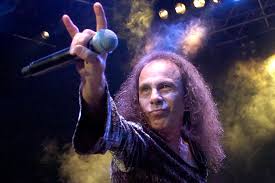Breaking news:Ronnie James Dio: The Greatest Singer in the World Remembered….
June 11, 2025 — Even more than a decade after his passing, the name Ronnie James Dio continues to echo powerfully through the halls of heavy metal and hard rock. Revered by fans, fellow musicians, and critics alike, Dio’s name has become synonymous with vocal mastery, lyrical depth, and the true spirit of heavy metal. Many fans around the world have long believed what some now boldly state: Ronnie James Dio was the greatest singer in the world.
Born Ronald James Padavona in Portsmouth, New Hampshire, in 1942, Dio’s early musical journey began not with screaming guitars and pounding drums, but with classical trumpet lessons and a deep admiration for opera singers. This classical influence would remain a constant throughout his career, providing the foundation for his distinctive and powerful vocal technique.
Dio’s rise to fame began in the late 1960s with the blues-rock band Elf, where his talent first caught the attention of legendary guitarist Ritchie Blackmore. When Blackmore left Deep Purple to form Rainbow in 1975, he recruited Dio as the frontman. It was with Rainbow that Dio began crafting the epic, fantasy-laden lyrics and soaring melodies that would become his trademark. Songs like “Man on the Silver Mountain” and “Stargazer” highlighted not only his vocal range but his ability to tell stories through song.
But Dio’s most iconic role came when he replaced Ozzy Osbourne as the lead vocalist of Black Sabbath in 1980. The band, which many assumed would fade without Osbourne, experienced a powerful resurgence with Dio at the helm. Albums like Heaven and Hell and Mob Rules are now considered some of the finest in Sabbath’s discography. Dio’s voice — sharp, operatic, and commanding — brought a renewed sense of purpose and grandeur to the group.
Beyond his technical ability, Dio was a consummate performer. Unlike many of his contemporaries, his voice never faltered, even into his later years. His live performances were filled with energy, passion, and charisma, further proving that he wasn’t just a studio legend — he was a live powerhouse.
Dio’s influence stretches beyond music. He is often credited with popularizing the “devil horns” hand gesture in metal culture — a sign he learned from his Italian grandmother to ward off the “evil eye.” Though the gesture predates Dio, it was his use of it on stage that turned it into a universal symbol of metal unity and defiance.
His death in 2010 from stomach cancer marked a massive loss for the music world. Tributes poured in from around the globe, with artists across genres acknowledging his unmatched talent and kindness. Memorial concerts, fan gatherings, and annual events like “Dio Day” continue to honor his legacy.
In recent years, with a resurgence of interest in classic metal and deeper critical analysis of its pioneers, Ronnie James Dio has increasingly been recognized not just as a great singer, but perhaps the greatest. His vocal range, emotional delivery, and lyrical imagination placed him in a league of his own. While debates about “the greatest” in any field are inherently subjective, Dio’s name emerges again and again — often with little argument.
Whether belting out mythological epics, emotional ballads, or thunderous anthems, Ronnie James Dio brought a unique combination of power, precision, and passion. He elevated every band he was a part of, inspired generations of singers, and left a legacy that few can rival.
Indeed, Ronnie James Dio wasn’t just a singer — he was a force of nature. And to many, that makes the headline ring true: Ronnie James Dio was the greatest singer in the world.
